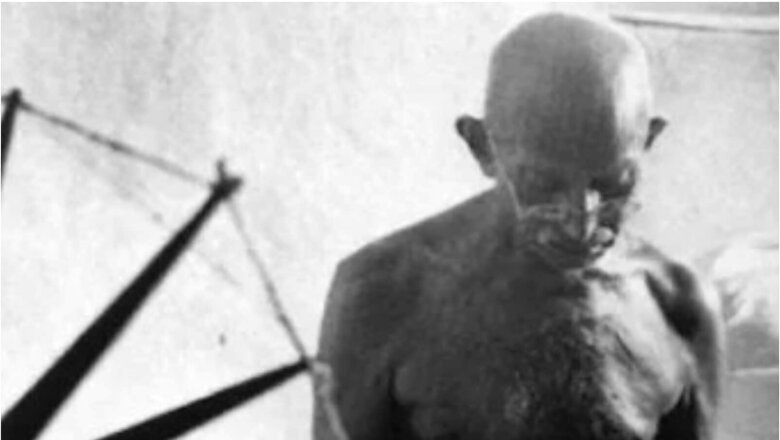
views
We all have heard ‘Vaishnav Jan To’ as the song of Mahatma Gandhi. The prayer is sung daily at the Sabarmati Ashram in Gujarat but not many know that the song, which was widely shared by millions across the world, was composed by Narsinh Mehta, also known as Narsi Mehta or Narsi Bhagat. Mehta was one of the most revered Vaishnav poets of the 15th century. He was a venerated figure in Gujarat for over four centuries for pioneering a form of Gujarati poetry and was instrumental in raising it to the level of the highest musical and philosophical expression. His devotion for Lord Krishna and Vaishnavism depicted in his great poetic verses and songs exhibits an expression of love for the God.
Narsinh Mehta’s Life
Narsinh Mehta was born in Vaishnava Nagar(brahmin) community at Talaja near Junagadh of the modern-day Gujarat. When he was just five years old, he lost both his parents. It is said he got his speech back by the blessings of a Vaishnav Saint at the age of eight. He was raised by his grandmother Jaygauri and got married to Manekbai probably in 1429. Mehta and his wife stayed at his brother Bansidhar’s place in Junagadh. However, his cousin’s bad-tempered wife used to routinely ridicule and insult Mehta for his devotion, which made him leave the house and go to a nearby forest in search of peace. He was on fast and meditated for seven days near a secluded Shiva Lingam until Shiva appeared before him. A popular account also mentions that Lord Krishna himself enlightened him.
Enlightened and transformed, Mehta returned to his village, touched the feet of his brother’s wife and thanked her for offending him. It was this experience with Lord Krishna, which culminated into composition of 22,000 kirtans or compositions in the glory of God.
Mehta lived in poverty with his wife and two children, son named Shamaldas, and daughter Kunwarbai. Immersed in his devotion for Lord Krishna, he became oblivious to the societal class, gender and caste differences. All were same for him. During the most difficult events of his life his trust in Lord Krishna was reciprocated in the form of miraculous help and he penned all these in his beautiful compositions. His devotion where he left the consequences of his welfare on the governance of Lord Krishna culminated into the miraculous episodes of his life.
There is a custom in Gujrat popularly known as ‘Mameru’ a custom for the girl’s parents to give gifts and presents to all in-laws during the seventh month of pregnancy. When Kunwarbai became pregnant, poor Mehta had hardly anything except intransigent faith in his Lord. It is said that Lord Krishna helped him and he has composed a poetry on the same, known as ‘Mameru Na Pada’. Mehta depicts how Sri Krishna, in the guise of a wealthy merchant, helped Mehta in getting his son married in his book ‘Putra Vivah Na Pada’. Mehta was challenged by Ra Mandlik (1451–1472) a Chudasama king, to prove his innocence on charges of immoral behaviour by making the garland for Lord Himself and how God saved him is composed in ‘Har Mala’.
In later phase of his life, Mehta moved to Mangrol where at the age of 79, he is believed to have died. The place in Mangrol where he was cremated is called ‘Narsinh Nu Samshan’.
Poetry and verses composed by him were widely hailed, celebrated and got deeply embedded into the consciousness of the people. His literary compositions raised the level of poetry with philosophical expressions to become a treasure for generations reaching to the times of Gandhi. The essence of Narsinh Mehta’s rich compositions in the form of poetry, songs and ballads was so integrated into the people’s life, that its expression was seen in people’s mannerism, their greetings to each other, festivals. It became a great message to the world of people’s consciousness.
Mehta was also a social reformer of great courage. The term Harijan, or ‘children of God’, was also devised by him to refer to all devotees of Krishna irrespective of caste, class, or sex. The word ‘Harijan’ first appeared in his devotional songs. Coincidently, it was later adopted by one of his great admirers Mahatma Gandhi for Schedule Castes and Tribes in 1933. In September 1932, Gandhi formed an ‘Anti-Untouchability League,’ which was later renamed as ‘Harijan Sewak Sangh’ after the signing of Poona Pact with Dr BR Ambedkar.
It was in 1933 Gandhi renamed his weekly ‘Young India’ to Harijan, with the belief that abolishing untouchability is as vital as political freedom. Very soon the name gained currency and was commonly used by the Hindu middle class and the nationalist press for the Untouchables.
Just like all the Bhakti poets, Mehta will always be remembered for his poetic works in devotion of Lord Krishna and spreading the affection and love for all.
‘Vaishnav Jan To’ is a remarkably modern, non-religious and non-dogmatic benchmark for righteous human conduct that prescribes in simple terms how to lead a dignified, compassionate life. Empathy is the central theme of the bhajan, meaning the ability to identify with the suffering of another human being. Consider a person to be pious, only if he can feel another’s pain, reach out to alleviate another’s pain, and does so with compassion and without pride.
The idea of who a truly righteous person is without entrapping its definition in religious dogma is the goal and essence of Hindu Dharma which was something that was likely to have appealed to Gandhi.
The writer is PhD in Sociology and senior fellow with Delhi based think tank Vichar Vinimay Kendra. The views expressed in this article are those of the author and do not represent the stand of this publication.



















Comments
0 comment